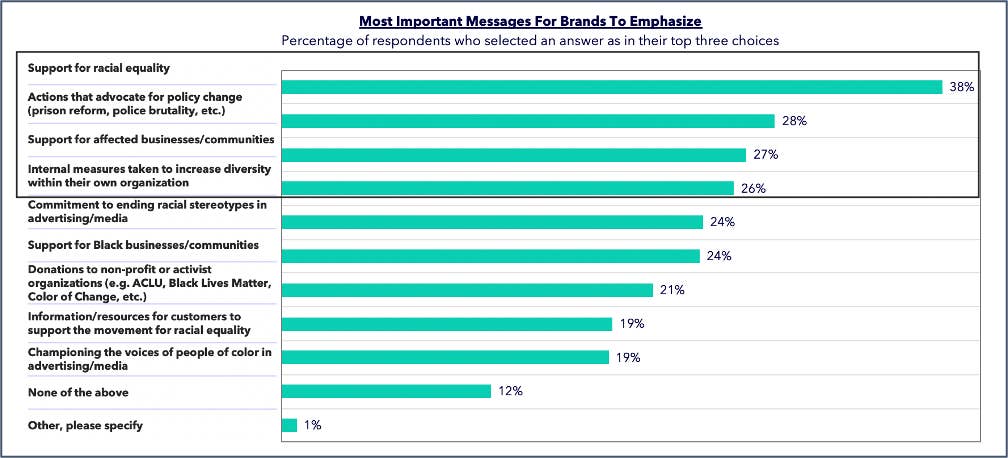At a time when we had planned to focus on “reopening the economy,” we are keenly aware of another ongoing epidemic impacting American lives – racial injustice against Black communities.
Hundreds of thousands of protesters are marching globally to voice frustrations, grief and anger over the systemic racism at play in the death of George Floyd and others in the Black community. The protests also come months into a pandemic that has disproportionately impacted Black Americans due to structural inequalities.
The following post will highlight key findings from our latest consumer survey, Dentsu Recovery Navigator, which has pivoted to focus on sentiment towards racial inequality and injustice in America, as well as attitudes on the role of brands.
Racial equality is elevated in American consciousness. As seen from the crowds attending protests and the outpouring of solidarity and discussion on social media, there is renewed momentum and urgency behind the fight for racial equality. This moment feels different as many are looking beyond the unjust killing of George Floyd as an isolated incident, to root out systemic racism. Our survey provides a snapshot of an America where racism and achieving racial equality is at the center of conversation:
- Racial equality is now among the top three most concerning issues to respondents:

- 72% of respondents are “very” or “extremely” concerned about “the coronavirus impacting people and communities of color at greater rates”
- 59% of respondents believe unresolved racial inequality is a significant issue in the US (28% say it is “somewhat” of an issue)
- 57% of respondents “strongly” support the peaceful protests throughout the country and world (24% “somewhat” support them)
Companies have a role to play in the movement for racial equality. In 2013 when #BlackLivesMatter was born and in 2016 when Colin Kaepernick took a knee, many marketers hesitated to weigh in. Now, major brands have not only issued statements of support but taken action against racial inequality, marking a significant tide change. Consumers are paying attention:
- 55% of respondents say brands should respond to and take a stance in support of racial equality for Black Americans
- 46% of respondents are paying MORE attention to what brands are saying/doing in response
- 72% of respondents agree: brands have a responsibility to drive social change
Support is key, but responses should also actively create change. Beyond stating support for racial equality (38%), consumers say actions such as advocating for policy change (28%), supporting affected communities (27%) and internal measures to support diversity (26%) are most important for brands to share. Interestingly, donations rank lower (21%), indicating that many may view them as important, but passive steps.

Black respondents were more likely than white respondents to say that brands should emphasize messages of support for Black businesses/communities (38%, 158i), as well as commit to ending racial stereotypes in media (31%, 129i) - one of the most prevalent ways our ideas as a society about race are shaped.
The bottom line: Staying silent comes at a price. Today’s consumers are paying more attention to how brands respond (or don’t) in times of crisis. Consumers increasingly find it unacceptable for brands to stay silent on social issues and view “neutrality” as a cop-out. Our findings suggest that this is true in the current moment as well:
- 70% of respondents are MORE likely to support brands that RESPOND
- 54% of respondents are LESS likely to support brands that STAY SILENT
What does this mean for modern marketers?
- Use your platform to be an ally for racial equality. A majority of consumers support protests and over half say brands should stand for racial equality. Brands entering the conversation should be sure to truly listen to the Black community before establishing their voice and following up with action.
- Align your response with your brand purpose. The data shows that there are many ways through which consumers want brands to step up. This gives marketers leeway to align responses with their purpose and values. The key will be ensuring that any response carries real weight for the Black community.
- Act with specificity. While consumers want to see support for racial equality, generic statements aren’t going to cut it. Modern consumers want to see brands put actions behind their words.
- Acknowledge your past. As brands enter the conversation, they should be prepared for heightened scrutiny. The best path forward is to acknowledge your history and explain why you are choosing to respond and what that response entails.
Download the latest Dentsu Pulse for our POV on how brands can respond >



